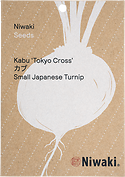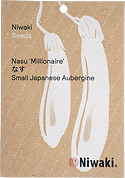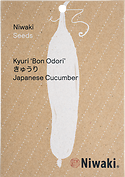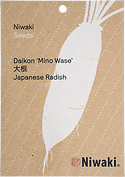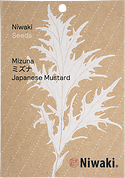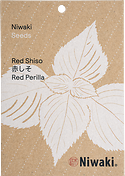Lacanophobiacs – look away now. No, not those with a horror of the work of French psychotherapist and proto-deconstructionist Jacques Lacan: lacanophobia is the fear of vegetables, obviously.
Whether you’re building/tidying vegetable boxes and patiently awaiting the last frost or you’re one step ahead planting seed trays in the greenhouse, it’s not too early to start thinking about what you will grow – and eat – in the warmer months.
This year, why not make room for something new and try Japanese herbs and vegetables, with seeds from Niwaki? Some of the seeds we offer need little introduction, although the Japanese varieties we stock do have different uses and features compared to their more common European ancestors.
Take the ‘Tokyo Cross’ Kabu (turnip) for example: a dainty root veg with a nutty, radishy taste. Or the ‘Millionaire’ Nasu (aubergine) – another diminutive variety distinguished not just by its size but also its thinner skin and sweet flesh. Another tiddler compared to the usual fare we see in the UK, the ‘Bon Odori’ Kyuri (cucumber) is nice and crunchy with fewer seeds – tailor made for pickling.
The ‘Mino Wase’ Daikon you’ve probably seen but couldn’t necessarily name (excuse the assumptions – this could well be your specialist subject). It’s that large, white elongated radish that is grated, pickled, roasted, boiled … as you can tell, it’s a versatile beast, and satisfyingly hefty when fully grown. It’s also the inspiration for our Daikon Tote Bag (our longer tote bag, designed to accommodate a real whopper Daikon).
Mizuna and Red Shiso might be the least familiar of the bunch. Mizuna produces edible, fringed leaves, looking not dissimilar to rocket/arugala but with a mustardy taste, while Red Shiso – from the mint family – looks like a purple nettle and has a very pleasant, moreish flavour that defies easy categorisation but contains notes of coriander, basil, cinnamon and even citrus.
Pick one or two or try the whole set. Worst case scenario you introduce the slugs to some new flavours, but if everything goes to plan you’ll be exploring hitherto impossible recipes with fresh, home-grown ingredients later in the year. Even in a big city you’ll be hard pressed to find many of these varieties for sale as fresh items, which is the reason we’re so excited to start growing.
Personally, when I finally taste Red Shiso again, I’m hoping for a Proustian rush to magic me back to an iced noodle shack on the outskirts of Kyoto where I first came encountered this unique herb.
You’ll find plenty of interesting recipes online (hang on … we are online) but here’s an easy one to bookmark from friends of Niwaki Aki and Akiko aka Miki Meshi, who are responsible for the delicious vegan treats at Niwaki Chiltern Street parties:
Recipe: Shiso and Carrot Salad
Ingredients
Red Shiso (grow your own): 10 leaves, torn or sliced
Grated carrot: 100g
Soy sauce: 1/2 teaspoon
Rice wine vinegar: 1/2 teaspoon
Sesame oil: 1 teaspoon
Method
Mix the soy sauce, vinegar and sesame oil to make a dressing, mix well with the shredded shiso and grated carrot and serve immediately. Colourful, simple and delicious!
Workshop & Prizes
Aki will be sharing her pickling expertise at a new Niwaki Chiltern Street Workshop on 15 March (booking link below). Your Niwaki seeds won’t have come to much by then, but you’ll be well-equipped to deal with your harvest when the time finally comes.
Later on in the year there will be prizes for the best overall herb crops, the largest daikon, the cutest turnip, the daintiest cucumber and even the rudest aubergine. Is that last one a bit puerile? Hey – we’re only human.
We’ll ‘judge’ the competition in September, giving everyone plenty of time to get the best from their plants. You can post your photos on Instagram anytime between now and then using the hashtag #niwakiseeds (so we can find them and others can size up the competition). Even if you don’t think you’ve grown a prize winner, we’d love to see how you get on, and in the meantime you can share you planting triumphs, tips and even frustrations with Niwaki and the rest of the world.







